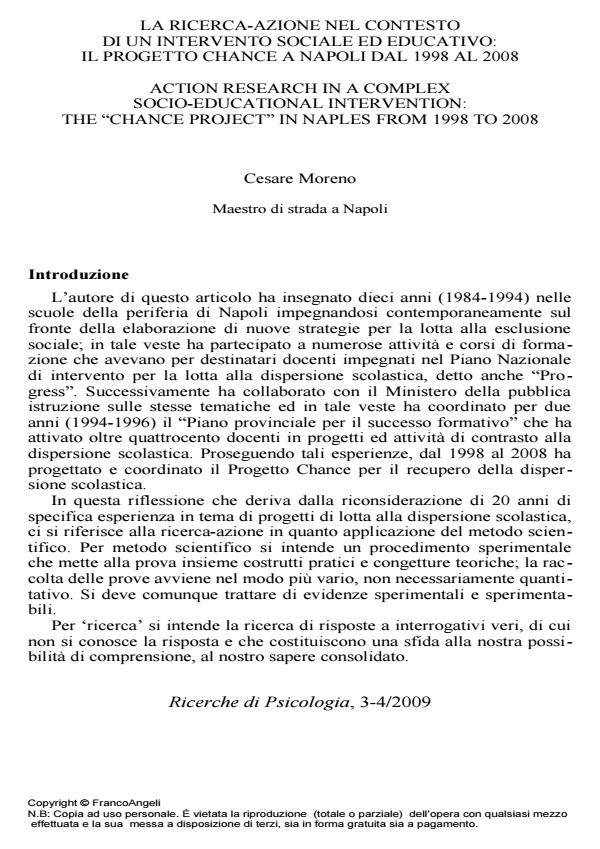La ricerca-azione nel contesto di un intervento sociale ed educativo: il progetto chance a Napoli dal 1998 al 2008
Titolo Rivista RICERCHE DI PSICOLOGIA
Autori/Curatori Cesare Moreno
Anno di pubblicazione 2011 Fascicolo 2009/3-4 Lingua Italiano
Numero pagine 21 P. 197-217 Dimensione file 430 KB
DOI 10.3280/RIP2009-003012
Il DOI è il codice a barre della proprietà intellettuale: per saperne di più
clicca qui
Qui sotto puoi vedere in anteprima la prima pagina di questo articolo.
Se questo articolo ti interessa, lo puoi acquistare (e scaricare in formato pdf) seguendo le facili indicazioni per acquistare il download credit. Acquista Download Credits per scaricare questo Articolo in formato PDF

FrancoAngeli è membro della Publishers International Linking Association, Inc (PILA)associazione indipendente e non profit per facilitare (attraverso i servizi tecnologici implementati da CrossRef.org) l’accesso degli studiosi ai contenuti digitali nelle pubblicazioni professionali e scientifiche
Chance è un progetto di ricerca-azione, promosso dal Ministero della Istruzione, dell’Università e della Ricerca alla fine degli anni ’80, che ha affrontato il problema degli adolescenti in situazione di esclusione sociale, non affrontato dall’istituzione scolastica. Per il suo carattere sperimentale il progetto si è dotato di forti apparati di riflessione presidiati da professionisti di diversa estrazione culturale. Ciò ha premesso di esperire diversi cicli sperimentali, attingendo anche al livello teorico e di farlo a partire da punti di vista diversi. L’interazione con la ricerca scientifica teorica ed accademica ha prodotto una consapevolezza maggiore riguardo al ruolo della teoria e ha consentito di approfondire importanti temi derivati dalla riflessione sulle pratiche. Inoltre, l’attività di ricerca ha consentito di delineare diversi profili di competenze per i diversi operatori e un percorso per il loro sviluppo. L’acquisizione più importante riguarda il ruolo dei conflitti in un particolare processo educativo: l’esistenza di conflitti e contraddizioni è la molla principale per lo sviluppo di una attività autentica di ricerca. Assumere la dimensione del conflitto nel progetto, sviluppare continue attività negoziali, è una dimensione isomorfa a quella della ricerca-azione e stabilisce un punto di contatto significativo tra ricerca-azione sul campo, intesa come ricerca di costrutti pedagogici operativi, e ricerca-azione di tipo teorico intesa come ricerca di costrutti di pensiero necessari a tenere insieme la complessità delle attività messe in campo. L’approccio, fondato su diversi punti di vista, ha provocato emozioni e relazioni che possono trovare una espressione metaforica condivisa in quello che viene chiamato ‘mito di fondazione’. Questo ha un ruolo centrale per costruire una narrazione che rappresenti il punto di incontro tra le metodologie sperimentate e le storie professionali degli operatori.;
- Supporting Team Reflexivity During the COVID-19 Lockdown: A Qualitative Study of Multi-Vision Groups In-person and Online Santa Parrello, Elisabetta Fenizia, Rosa Gentile, Ilaria Iorio, Clara Sartini, Massimiliano Sommantico, in Frontiers in Psychology 719403/2021
DOI: 10.3389/fpsyg.2021.719403 - Una esperienza di ricerca-azione volta a ridurre la dispersione scolastica nelle scuole arabo-israeliane Francesco Paolo Colucci, Mahmud Said, Jamal Dakduki, in PSICOLOGIA DI COMUNITA' 1/2018 pp.59
DOI: 10.3280/PSC2018-001005 - Ranimer l’espoir. L’intervention psycho-éducative de Maestri di Strada Barbara De Rosa, Santa Parrello, Massimiliano Sommantico, in Connexions /2017 pp.181
DOI: 10.3917/cnx.107.0181
Cesare Moreno, La ricerca-azione nel contesto di un intervento sociale ed educativo: il progetto chance a Napoli dal 1998 al 2008 in "RICERCHE DI PSICOLOGIA " 3-4/2009, pp 197-217, DOI: 10.3280/RIP2009-003012